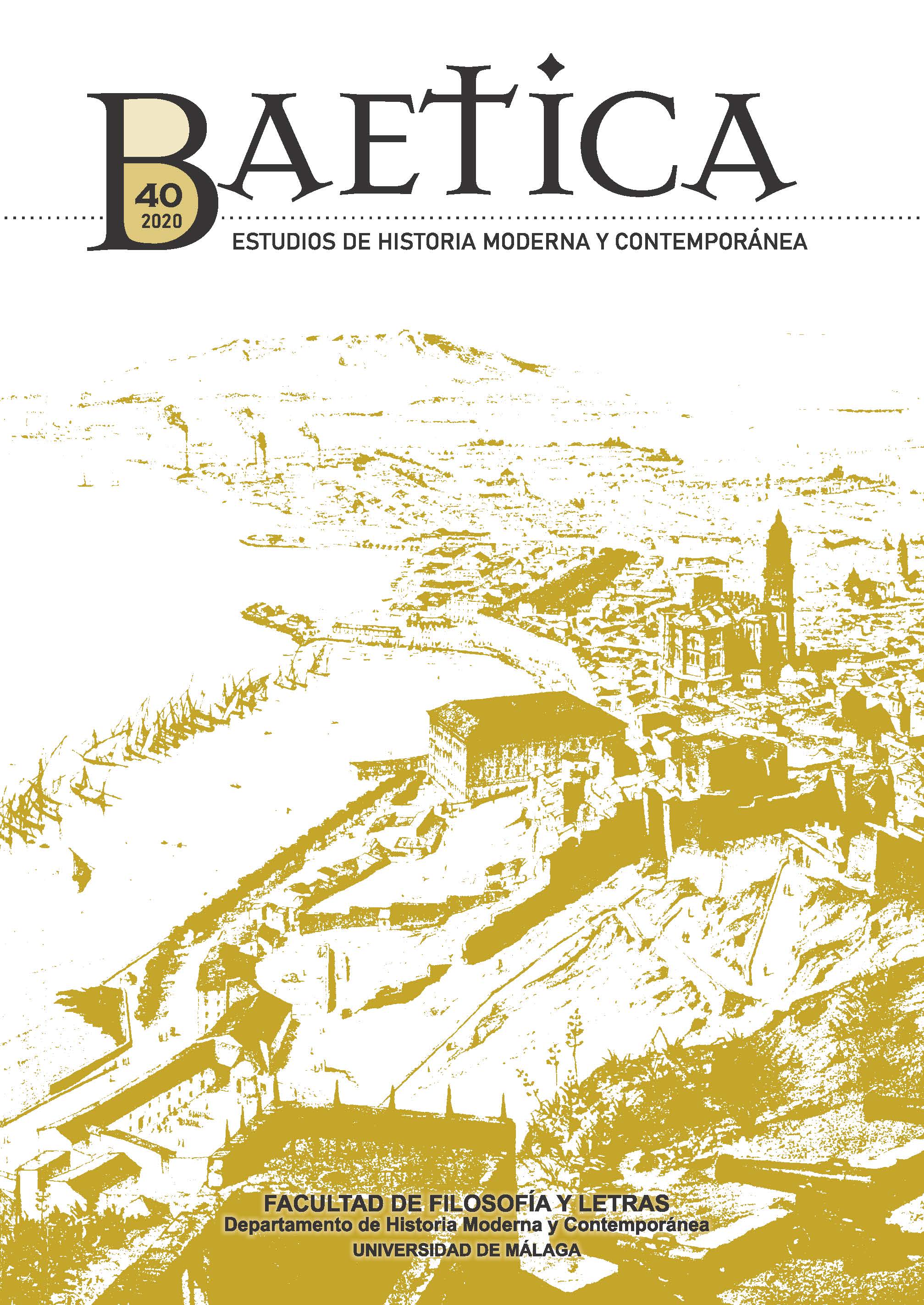Cracking of the Social Consensus Theory with the Coup D'État in Argantina: The Cases of Bank Workers and Students in the Province of Mendoza (1975)
DOI:
https://doi.org/10.24310/BAETICA.2020.v1i40.10598Keywords:
Coup d'état, Mendoza, Argentina, Local history, Revolutionary Workers PartyAbstract
This article offers a historical reconstruction of two paradigmatic cases in the repressive policy prior to the 1976 coup in Mendoza, which targeted members of the Revolutionary Workers Party: the first kidnapping and momentary disappearance of bank worker Pablo Marín and the murder of student Gladys Beatriz Sabatino and kidnapping, disappearance and murder of student Amadeo Sánchez Andía. The reconstruction of the events shows the massive combative reaction of the victims work and study colleagues which in the case of Marín resulted in his release. The hypothesis of the article calls into question the idea that the coup was received with relief and without resistance by the bulk of society. For the work, the analysis of journalistic, judicial and oral sources was used.
Downloads
Metrics
References
ANTOGNAZZI, Irma (1997), “La lucha armada en la estrategia política del PRT-ERP (1965-1976)”, Razón y Revolución, 3, Buenos Aires.
AYLES TORTOLINI, Violeta (2020), “Orígenes del PRT-ERP en Mendoza”, Estudios: Centro de Estudios Avanzados, 44. pp. 83-101.
CALVEIRO, Pilar (2005), Política y/o violencia. Una aproximación a la guerrilla de los años 70, Grupo Editorial Norma, Buenos Aires.
CARASSAI, Sebastián (2013), Los años setenta de la gente común. La naturalización de la violencia, Siglo XXI, Buenos Aires.
CARNOVALE, Vera (2011), Los combatientes. Historia del PRT-ERP, Siglo XXI, Buenos Aires.
CUETO, Adolfo; ROMANO, Aníbal y SACCHERO, Pablo (1994), Historia de Mendoza. Desde los primitivos habitantes a nuestros días, Diario Los Andes, Mendoza.
D’ANTONIO, Débora y RODRÍGUEZ AGÜERO, Laura (2017), “Una lectura de la represión desde los bordes del género”, Ponencia en III Jornadas de la Red de Estudios sobre Represión y Violencia Política, Universidad Nacional de La Plata, Buenos Aires.
LACOSTE, Pablo (2004), “Utopía y resistencia (1955-1973)”, en A. ROIG; P. LACOSTE y M.ª C. SATLARI (comps.), Mendoza a través de su historia, Caviar Bleu, Mendoza, pp. 335-366.
LEVÍN, Florencia (2009), “El pasado reciente entre la historia y la memoria”, en VV.AA., La historia reciente como desafío a la investigación y pensamiento en Ciencias Sociales, CAICYT CONICET, Buenos Aires.
LONGONI, Ana (2007), “El mandato sacrificial”, en I Jornada académica: Partidos armados en la Argentina de los setenta, Universidad Nacional de San Martín.
MICALE, Adriana (2004), “Crisis y conflicto (1973-1983)”, en A. ROIG; P. LACOSTE y M.ª C. SATLARI (comps.), Mendoza a través de su historia, Caviar Bleu, Mendoza, pp. 367-406.
OBERTI, Alejandra (2015), Las revolucionarias. Militancia, vida cotidiana y actividad en los setenta, Edhasa, Buenos Aires.
RODRÍGUEZ AGÜERO, Laura (2013), Ciclo de protestas, experiencias organizativas y represión paraestatal: Mendoza, 1972-1976, Tesis de Doctorado, Universidad Nacional de La Plata, Facultad de Humanidades y Ciencias de la Educación, Memoria Académica, disponible en: http://www.memoria.fahce.unlp.edu.ar/tesis/te.889/te.889.pdf
RODRÍGUEZ AGÜERO, Laura (2019), “Las hijas del trueno”. Algunas notas sobre el carácter sexuado de la represión en Mendoza (1976)”, Páginas, Año 11, 27, pp. XX.
RODRÍGUEZ AGÜERO, Laura; BARALDO, Natalia y LOZANO, Pablo (2016), Hacia adentro. La Bancaria Seccional Mendoza. Acuarelas de sus luchas y desaparecidos/as, La Bancaria, Mendoza.
RODRÍGUEZ AGÜERO, Laura; PAREDES, Héctor Alejandro (2012). “Organizaciones de derecha y conspiración antiallendista en Mendoza, Argentina (1970-1976)”, Revista de Estudios Trasandinos 17, Asociación Chileno Argentina de Estudios Históricos e Integración Cultural, pp. 71-88.
SANTUCHO, Julio (2004), Los últimos guevaristas. La guerrilla marxista en la Argentina, Vergara, Buenos Aires.
SEOANE, María (1991), Todo o nada. La historia secreta y política del jefe guerrillero Mario Roberto Santucho, Planeta, Buenos Aires.
Downloads
Published
How to Cite
Issue
Section
License
This journal provides immediate free access to its content on the principle of making research freely available to the public. All content published in Baetica. Modern and Contemporary History Studies are subject to the Creative Commons Acknowledgment-NoCommercial-ShareAlike 4.0 license, the full text of which can be found at <http://creativecommons.org/licenses/by-nc-sa/4.0>
They may be copied, used, disseminated, transmitted and publicly displayed, provided that:
The authorship and the original source of its publication (magazine, publisher and URL of the work) must be cited.
They are not used for commercial purposes.
The existence and specifications of this use license are mentioned.
Copyrights are of two kinds: moral and patrimonial. Moral rights are perpetual, inalienable, non-transferable, inalienable, unattachable and imprescriptible prerogatives. In accordance with copyright legislation, BAETICA. Estudios de Historia Moderna y Contemporánea recognizes and respects the moral right of the authors, as well as the ownership of the patrimonial right, which will be transferred to the University of Malaga for its open access dissemination. Economic rights refer to the benefits obtained from the use or disclosure of works. BAETICS. Estudios de Historia Moderna y Contemporánea is published in open access and is exclusively authorized to carry out or authorize by any means the use, distribution, disclosure, reproduction, adaptation, translation or transformation of the work.
It is the responsibility of the authors to obtain the necessary permissions of the images that are subject to copyright.
Authors whose contributions are accepted for publication in this journal will retain the non-exclusive right to use their contributions for academic, research, and educational purposes, including self-archiving or deposit in open access repositories of any kind.
The electronic edition of this magazine is edited by the Editorial of the University of Malaga (UmaEditorial), being necessary to cite the source in any partial or total reproduction.







2.png)
